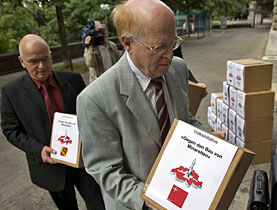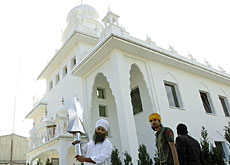Voters to decide on controversial minaret ban

Supporters of a ban on the construction of minarets in Switzerland have handed in the necessary signatures to force a nationwide ballot.
The cabinet has come out against the controversial people’s initiative which was launched by members of the rightwing Swiss People’s Party and an ultra conservative party, the Federal Democratic Union, in 2007.
Islamic countries as well as the United Nations expert on racism raised concern over the initiative.
Jasmin Hutter, a People’s Party parliamentarian said that minarets are not religious symbols but rather a claim to political dominance. She also said they represented oppression toward women.
Her party colleague, Walter Wobmann, said a ban did not violate the freedom of religion, recalling that mosques without minarets already exist.
Underlying the initiative is the persuasion to counter “creeping Islamisation”, according to parliamentarian Dominique Baettig. He argues the one-billion-strong religion is intolerant toward women and homosexuals and incongruent with Swiss values.
But in a statement, Swiss President Pascal Couchepin said the government would recommend citizens reject the initiative when it comes to a vote in the next few years.
Several other cabinet members have also spoken out against the proposed ban, saying the initiative was a move against a religious minority and a threat to internal peace.
Unconstitutional, dangerous
The centre-right Christian Democratic Party with its traditional Catholic background has called the idea of banning minarets unconstitutional, dangerous and stupid. The country’s association of Protestant churches has rejected it as divisive.
Marcel Stüssi, a researcher at Lucerne University who wrote on the legal validity of the initiative, says the submission of signatures marks the beginning of the broader social discussion on the issue.
“Now the political process starts and you have the other political forces that come into play,” he told swissinfo.
Stüssi, who personally opposes the initiative, says there is presently a constitutionally enforceable right to erect minarets. He believes some Swiss who originally supported the initiative will reconsider.
“It is very likely that the right to build a minaret is covered under Article 15 of the Swiss Constitution,” he said. “It was never decided upon by the Federal Court.”

More
People’s initiative
Uncharted territory
He says any ban would be incompatible with articles of international law to which Switzerland is a signatory.
In the event that Swiss voters were to ban minarets, any of the 107 other signatories to the Vienna Convention of the Law of Treaties of 1969 could launch action against Switzerland.
“It is not really known what will really happen if all of this goes through,” Stüssi said, adding that enforcement would for all intents and purposes be impossible.
“But what is most damaging is the reputation,” he said.
In any case, cantonal zoning laws already prohibit the construction of buildings that don’t match their surroundings.
“You cannot have a minaret in an old city centre in Switzerland,” says Stüssi. “It is anyway only possible in commercial zones now.”
He calls the initiative “obsolete and unnecessary” but adds that the public discourse on the issue could put Switzerland in a positive light, at least for the majority who at this point oppose a ban.
“Crisis always creates an opportunity. A popular vote against a proposed ban would be the highest declaration for the recognition of the Swiss Muslim community.”
“It would also be an expressed statement that anybody is equally subject to the law and to the political process,” Stüssi said.
Justin Häne, swissinfo.ch
A minaret is a tower, traditionally part of a mosque, with a balcony from which a muezzin calls Muslims to prayer. In modern mosques, the minaret is equipped with loudspeakers.
In Switzerland, only the mosques in Geneva and Zurich have a minaret. The call to prayer is not made from these minarets.
In Switzerland, more than three quarters of the population are Christians – 42% are Catholic, 35% Protestant and 2.2% other Christian denominations.
With more than 310,000 members (4.3%), Islam is the second-largest religion in the country. Twelve per cent of Muslims have a Swiss passport. They come mainly from the Balkans and Turkey.
The Jewish community has about 18,000 members (0.2%), of which 80% are Swiss.
There are 28,000 Hindus and 21,000 Buddhists.

In compliance with the JTI standards
More: SWI swissinfo.ch certified by the Journalism Trust Initiative












You can find an overview of ongoing debates with our journalists here . Please join us!
If you want to start a conversation about a topic raised in this article or want to report factual errors, email us at english@swissinfo.ch.